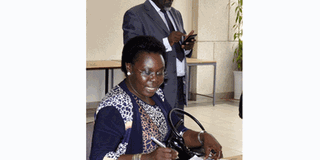MPs begin drive to return law on homosexuality

Zombo Woman MP Grace Kwiyucwiny appends her signature in a book in support of a drive to reintroduce the Anti-Homosexuality Act yesterday as MP Eddie Kwizera (Bufumbira East) looks on. PHOTO BY Geoffrey sseruyange
What you need to know:
Urgent. Lawmakers want Parliament to put on hold the handling of the ongoing Budget process to ensure the re-passage of the anti-gays law.
Parliament.
At least 91 MPs had by yesterday evening signed a document in support of a drive to re-introduce the Anti-Homosexuality Act 2014, which was nullified by the Constitutional Court last Friday, on grounds that Parliament passed it without the required quorum.
The court’s action removed the law from the country’s statute books in spite of protests from the State that the petitioners did not tender actual evidence to support their claim that there was no quorum when it was enacted.
Kawempe North MP Latif Sebaggala kicked off the collection of signatures yesterday afternoon, saying colleagues want Parliament to put on hold the handling of the ongoing Budget process and first ensure the re-passage of the anti-gay activity law when it resumes from the mini recess later this month.
When the Anti-Homosexuality Bill was tabled before Parliament in 2009, as a private member’s initiative by Ndorwa West MP David Bahati, it was condemned by the Western countries as an affront to human rights.
Its supporters insisted it was essential in the protection of Uganda’s cultural values, arguing that same sex relationships are a threat to the country’s morals and posterity.
By press time, it was not clear if Mr Bahati would again take the lead in presenting the Bill. Efforts to reach him for comment were unsuccessful.
However, available information at Parliament suggest that the MPs will want the consideration of a new Bill to be the first item on the Order Paper.
They will also hope that the Speaker grants their request for House Rules of Procedure to be suspended to allow the Bill be passed without going through the lengthy first, second and third reading stages.
“When we reconvene from recess, the first item on the agenda should be the passing of the Bill. This is not a normal Bill and the Speaker will allow us to amend the Rules of Procedure. Whether we are denied aid and we live in poverty, we shall live by that,” Mr Sebaggala said.
Last week, the court did not pronounce itself on whether the Bill violates any human rights- one of the demands of the petitioners.
Aftermath
When President Museveni, who was initially opposed to the Act, backtracked and assented to it, to the delight of the vast majority of Ugandans as revealed in ensuing public reaction, some countries in the West responded by cutting donor support.
Mr Museveni signed the law which was passed last December and disparaged Western powers, vowing that “they cannot dictate to us.”
At the weekend, the President, whose government has been criticised for allegedly playing politics with the homosexual controversy and buckling under pressure from abroad, said the NRM’s parliamentary caucus will sit and chart a way forward.
Parliament is currently on a mini plenary recess to allow committees sift through ministerial budget estimates ahead of passing of the 2014/15 Budget.
More than 20 MPs later addressed a press conference at Parliament where they denigrated Western countries that have been speaking up against the Bill as “colonialists whose minds are twisted.”
Kampala Woman MP Nabila Nagayi Ssempala said the envisaged re-enacted law should also include a clause that explicitly bars anal sex, saying the practice is “closeted homosexuality hidden under heterosexuality where men are forcing themselves on [and engaging in anal sex with their] women” after being denied gay sex.
On the day Parliament passed the anti-gay law, Prime Minister Amama Mbabazi’s caution about their not being quorum went unacknowledged by Speaker Rebecca Kadaga.
Under the House rules, when a question over quorum is raised, the Speaker is obligated to temporarily suspend proceedings to ascertain if this is the case.
This time, the MPs promised that the issue of quorum will not arise. Parliament’s quorum is one third of MPs entitled to vote.
In a telephone interview yesterday, Ms Hellen Kaweesa, the Parliament spokesperson, said the House is studying the court ruling to determine the next course of action.
“Pertinent issues were raised. Parliament is waiting for the ruling to read it, understand it and pronounce itself on the next course of action,” Ms Kaweesa said.




